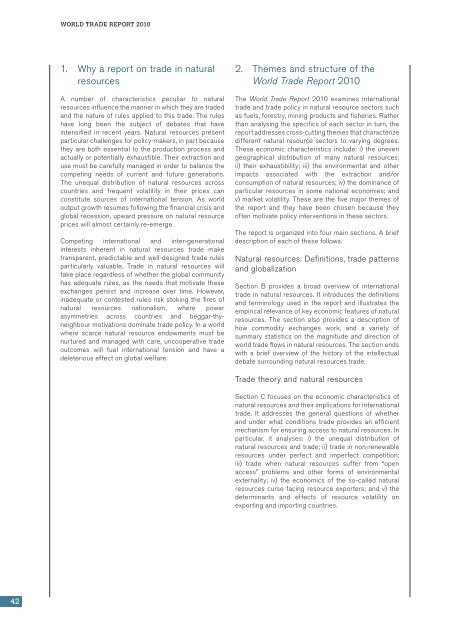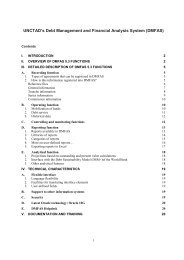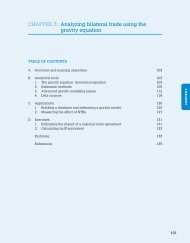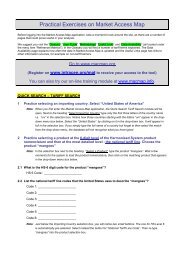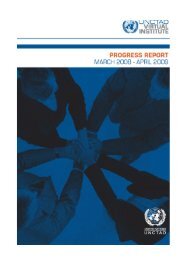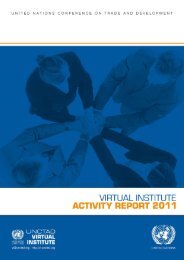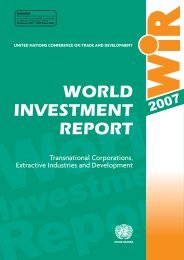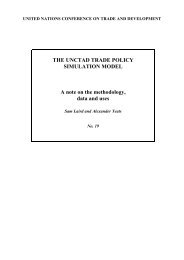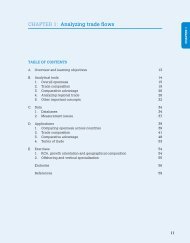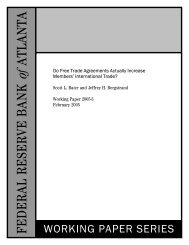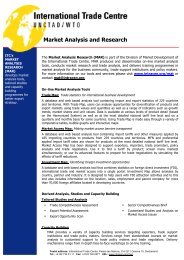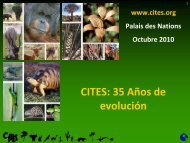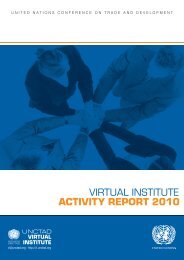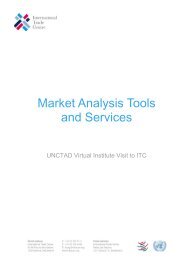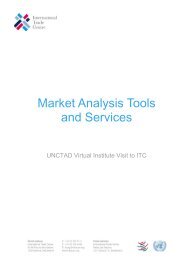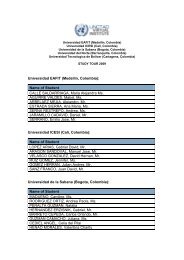WTO: World Trade Report 2010 - World Trade Organization
WTO: World Trade Report 2010 - World Trade Organization
WTO: World Trade Report 2010 - World Trade Organization
You also want an ePaper? Increase the reach of your titles
YUMPU automatically turns print PDFs into web optimized ePapers that Google loves.
world trade report <strong>2010</strong><br />
1. Why a report on trade in natural<br />
resources<br />
A number of characteristics peculiar to natural<br />
resources influence the manner in which they are traded<br />
and the nature of rules applied to this trade. The rules<br />
have long been the subject of debates that have<br />
intensified in recent years. Natural resources present<br />
particular challenges for policy-makers, in part because<br />
they are both essential to the production process and<br />
actually or potentially exhaustible. Their extraction and<br />
use must be carefully managed in order to balance the<br />
competing needs of current and future generations.<br />
The unequal distribution of natural resources across<br />
countries and frequent volatility in their prices can<br />
constitute sources of international tension. As world<br />
output growth resumes following the financial crisis and<br />
global recession, upward pressure on natural resource<br />
prices will almost certainly re-emerge.<br />
Competing international and inter-generational<br />
interests inherent in natural resources trade make<br />
transparent, predictable and well-designed trade rules<br />
particularly valuable. <strong>Trade</strong> in natural resources will<br />
take place regardless of whether the global community<br />
has adequate rules, as the needs that motivate these<br />
exchanges persist and increase over time. However,<br />
inadequate or contested rules risk stoking the fires of<br />
natural resources nationalism, where power<br />
asymmetries across countries and beggar-thyneighbour<br />
motivations dominate trade policy. In a world<br />
where scarce natural resource endowments must be<br />
nurtured and managed with care, uncooperative trade<br />
outcomes will fuel international tension and have a<br />
deleterious effect on global welfare.<br />
2. Themes and structure of the<br />
<strong>World</strong> <strong>Trade</strong> <strong>Report</strong> <strong>2010</strong><br />
The <strong>World</strong> <strong>Trade</strong> <strong>Report</strong> <strong>2010</strong> examines international<br />
trade and trade policy in natural resource sectors such<br />
as fuels, forestry, mining products and fisheries. Rather<br />
than analysing the specifics of each sector in turn, the<br />
report addresses cross-cutting themes that characterize<br />
different natural resource sectors to varying degrees.<br />
These economic characteristics include: i) the uneven<br />
geographical distribution of many natural resources;<br />
ii) their exhaustibility; iii) the environmental and other<br />
impacts associated with the extraction and/or<br />
consumption of natural resources; iv) the dominance of<br />
particular resources in some national economies; and<br />
v) market volatility. These are the five major themes of<br />
the report and they have been chosen because they<br />
often motivate policy interventions in these sectors.<br />
The report is organized into four main sections. A brief<br />
description of each of these follows.<br />
Natural resources: Definitions, trade patterns<br />
and globalization<br />
Section B provides a broad overview of international<br />
trade in natural resources. It introduces the definitions<br />
and terminology used in the report and illustrates the<br />
empirical relevance of key economic features of natural<br />
resources. The section also provides a description of<br />
how commodity exchanges work, and a variety of<br />
summary statistics on the magnitude and direction of<br />
world trade flows in natural resources. The section ends<br />
with a brief overview of the history of the intellectual<br />
debate surrounding natural resources trade.<br />
<strong>Trade</strong> theory and natural resources<br />
Section C focuses on the economic characteristics of<br />
natural resources and their implications for international<br />
trade. It addresses the general questions of whether<br />
and under what conditions trade provides an efficient<br />
mechanism for ensuring access to natural resources. In<br />
particular, it analyses: i) the unequal distribution of<br />
natural resources and trade; ii) trade in non-renewable<br />
resources under perfect and imperfect competition;<br />
iii) trade when natural resources suffer from “open<br />
access” problems and other forms of environmental<br />
externality; iv) the economics of the so-called natural<br />
resources curse facing resource exporters; and v) the<br />
determinants and effects of resource volatility on<br />
exporting and importing countries.<br />
42


